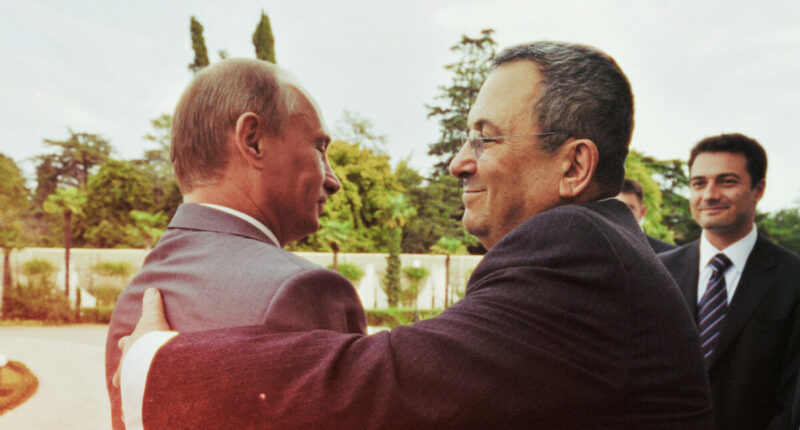Share this @internewscast.com
A new investigation by DropSite News is raising fresh questions about the shadowy international dealings of Jeffrey Epstein, this time focusing on the sex trafficker’s secret involvement with Mossad and efforts to aid Israel in opening a covert backchannel to Russia amid the chaos of the Syrian Civil War.
According to reports, Jeffrey Epstein played a pivotal role for Ehud Barak, not just in social networking but as a strategic asset for Israeli intelligence. Epstein provided invaluable insights to Israel’s former prime minister, who also held positions as head of intelligence and defense minister. He offered information from Russian elite circles, updates on Putin’s European and American contacts, and even advice on engaging with Mossad, as highlighted by Drop Site News.
In an email exchange from February 2014, revealed by Drop Site News, Epstein informed Barak, “With unrest erupting in Ukraine, Syria, Somalia, and Libya, and the desperation of those in power, this seems perfect for you.” Barak responded, acknowledging the opportunity but noting the challenge in converting it into financial gain, suggesting further discussion on the matter. While their efforts didn’t alter the Kremlin’s stance on Assad, they laid a foundation for future U.S.-Russia collaboration on dismantling Syria’s chemical arsenal.
The email cache also indicates Epstein’s broader ambitions to influence U.S. foreign policy. He and Barak aimed to press the Obama administration for more assertive action in Syria or to negotiate with Moscow for Assad’s exit. Epstein, however, grew frustrated with the U.S. approach, particularly regarding Iran’s regional influence and ongoing nuclear discussions.
Michael Oren, a former Israeli ambassador in Washington, recounted Israel’s diplomatic strategy of maintaining a low profile in the Syrian crisis, opting for subtle influence while publicly denying involvement. In contrast, Barak and Epstein’s activities suggest a more direct, though covert, involvement in shaping events. They utilized media narratives and discreet diplomatic efforts in Moscow and Washington to advance Israeli strategic objectives.
By 2015, Barak and Epstein reactivated their secretive channels as Barak opposed Obama’s nuclear agreement with Iran, seeking to encourage renewed U.S. military actions against Iranian sites. Their plan heavily relied on Epstein’s extensive network, which included American diplomats, intelligence officials, and international leaders. Drop Site News notes that Epstein’s talent for aligning superpower interests with Israel’s hinged on his adept use of his connections across U.S., Israeli, and Russian intelligence domains.
Although Barak and Epstein secured a rare meeting with Vladimir Putin in the summer of 2013, they could not persuade Russia to withdraw support from Assad. Nevertheless, documents reveal their negotiations played a role in the eventual international agreement for Syria’s chemical weapons disarmament. Barak had expressed confidence in late 2011 that Assad’s downfall was “inevitable,” yet the regime persisted as Russia and Iran intensified their backing, defying initial expectations.
The Drop Site News report also touches on Epstein’s known personal ties to top Israeli officials, including Barak and former Prime Minister Ehud Olmert, and his financial support for military-linked charities such as Friends of the IDF. Recently surfaced emails released by a pro-Palestinian hacking collective and archived by whistleblower platform Distributed Denial of Secrets add weight to the picture of Epstein as a globe-trotting fixer with deep intelligence links—despite his notoriety in sex trafficking circles.
Epstein’s activities reportedly extended to helping broker Israel’s 2017 security agreement with Mongolia, managing business deals and cyber-technology introductions that “laid the foundation for official Israeli security deal-making.” While the full scope of Epstein’s function as an agent or facilitator for Mossad remains hotly debated, the documents from Drop Site News push the boundary of public knowledge regarding collaboration between elite intelligence, diplomacy, and off-the-books financial operations.
As Barak and Epstein’s maneuvering inside Russian and American power circles continues to surface, new questions arise about the intersection of covert diplomacy, intelligence gathering, and the shadowy world of private power brokers. With the Syrian civil war’s legacy still haunting the region, the full story of Epstein’s role may not yet be told.

















